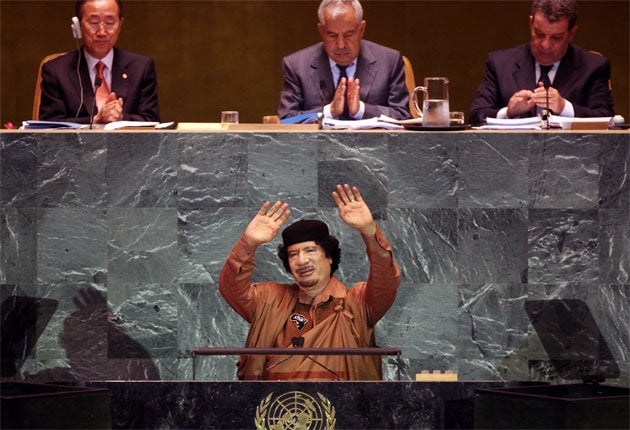We can change the world together, Obama tells UN
President targets global consensus on key issues as he ushers in new era of co-operation and warns anti-Americanism is 'no excuse' for failing to address international challenges

Sometimes righteous and sometimes scolding, President Barack Obama took the podium at the United Nations General Assembly for the first time yesterday to issue a clarion call to the world to reject "reflexive anti-Americanism" and join with him to usher in an era of global co-operation.
In his most comprehensive foreign affairs speech since coming to office, Mr Obama laid out "four pillars" of action to secure a better future: the pursuit of a world without nuclear weapons, the promotion of peace and security, the fight against climate change and the wider sharing of economic prosperity.
Acknowledging that the United States of recent years may have fallen short of international expectations, Mr Obama reiterated the message he had given in other key speeches around the world, notably this spring in Cairo, Ankara and Prague, that he was a different kind of leader. "The United States stands ready to begin a new chapter of international co-operation," he pledged in his closing words.
Less emollient, however, was his tone in exhorting the rest of the world to respond to the change he is promising by more honestly accepting their responsibilities in tackling world crises and fulfilling the promise embodied by the UN charter.
"We must embrace a new era of engagement based on mutual interests and mutual respect, and our work must begin now," he said.
"Make no mistake, this cannot be solely America's endeavour. Those who used to chastise America for acting alone in the world cannot now stand by and wait for America to solve the world's problems alone... Now is the time for all of us to take our share of responsibility for a global response to global challenges". Those, he went on, remained many.
"We need to admit that we are not living up to that responsibility," he said, listing calamities from terror attacks to genocides, mass atrocities, melting ice caps and pandemic disease.
"I say this not to sow fear, but to state fact: the magnitude of our challenges has yet to be met by the measure of our action".
As Mr Obama progressed, so the interruptions of polite applause in the chamber became gradually more frequent. They clapped when he spoke of his decision to ban torture by the US, when he pledged to end the suffering of Darfur and when he vowed to press for peace in the Middle East. They applauded when he said it did no one any good to pretend Israel did not bear some responsibility for that conflict. And they did likewise when he chastised Palestinians for erring "when they choose vitriolic attacks against Israel".
The President knew that he had a comfortable margin of capital with his New York audience simply by virtue of not being his predecessor. He did not need to mention George Bush by name. Noting that today, the US had "re-engaged with the United Nations," he said: "We have paid our bills".
And on the efforts to curb global warming, the US had "moved from a bystander to a leader".
Mr Obama argued that lingering "scepticism and distrust" felt towards America around the world was due partly "to misperceptions and misinformation about my country". But clearly alluding to the 2003 invasion of Iraq, he suggested it was due also to "a belief that on certain critical issues, America has acted unilaterally, without regard for the interests of others. This has fed an almost reflexive anti-Americanism." But that, he warned, has "too often has served as an excuse for our collective inaction".
The address was the high watermark of four solid days of intense diplomatic engagement by Mr Obama. On Tuesday, he delivered the keynote speech at the climate change summit in New York. Today, he will chair a special Security Council summit session on nuclear proliferation before heading to Pittsburgh tonight to open proceedings at the Group of 20 Summit which continues tomorrow. He has meanwhile held bilateral talks on Middle East peace and with the leaders of China, Russia and Japan.
As for the UN, he said, it had sometimes "become a forum for sowing discord instead of forging common ground; a venue for playing politics and exploiting grievances rather than solving problems. After all, it is easy to walk up to this podium and to point fingers and stoke division." He may have had Libya and Iran in mind, whose leaders were to follow him to the podium later in the day.
He later singled out Iran and North Korea for particular opprobrium for continuing to refuse to heed UN resolutions on relinquishing their nuclear ambitions. "If the governments of Iran and North Korea choose to ignore international standards; if they put the pursuit of nuclear weapons ahead of regional stability and the security and opportunity of their own people... they must be held accountable".
Obama's speech: Main points
* America is ready for a "new era of engagement" but other nations must step up and shoulder some of the burden.
* US "will not waiver" in pursuit of a lasting Middle East settlement and does not accept "legitimacy" of Israeli settlements.
* Ridding the world of nuclear weapons is a top priority.
* Iran and North Korea must be held accountable if they ignore UN resolutions on their relinquishing nuclear arms development.
Subscribe to Independent Premium to bookmark this article
Want to bookmark your favourite articles and stories to read or reference later? Start your Independent Premium subscription today.

Join our commenting forum
Join thought-provoking conversations, follow other Independent readers and see their replies